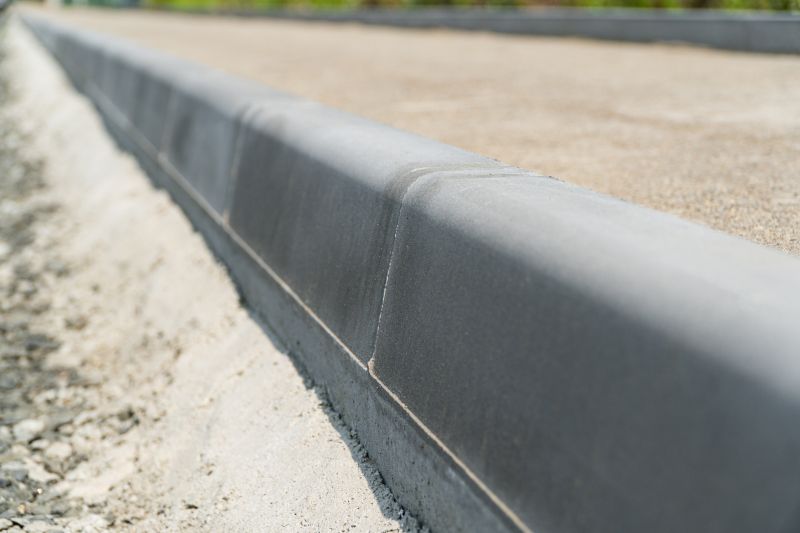Leading Choices For Products For Concrete Curbses Projects
Find the top products that support efficient installation, finishing, and long-term performance of concrete curbs.
 Concrete curbs are essential components in landscape architecture, road construction, and property delineation. They serve to contain, direct, and protect various surfaces, providing a clean separation between sidewalks, driveways, and landscaped areas. Selecting the right products for installing or repairing concrete curbs involves understanding the different tools and materials available, each designed to meet specific project needs. From forms and molds to sealing and finishing products, the variety ensures that professionals and DIY enthusiasts can find suitable options for their projects.
Concrete curbs are essential components in landscape architecture, road construction, and property delineation. They serve to contain, direct, and protect various surfaces, providing a clean separation between sidewalks, driveways, and landscaped areas. Selecting the right products for installing or repairing concrete curbs involves understanding the different tools and materials available, each designed to meet specific project needs. From forms and molds to sealing and finishing products, the variety ensures that professionals and DIY enthusiasts can find suitable options for their projects.
Top Overall Option
Concrete Curbing Forms System
A versatile and comprehensive form system designed for creating precise and durable concrete curbs. It offers adjustable panels, easy setup, and compatibility with various project sizes, making it suitable for both professionals and DIY enthusiasts. Its durable materials ensure repeated use and consistent results, contributing to efficient workflow and high-quality finishes.
Types of Products For Concrete Curbses
Concrete Curb Forms
Reusable molds that shape the concrete during pouring, available in various sizes and configurations.
Expansion Joints
Materials that allow for movement and prevent cracking due to temperature fluctuations and ground shifting.
Reinforcement Mesh
Steel or fiber mesh used to strengthen the curb and improve its structural integrity.
Concrete Sealants
Protective coatings applied after curing to enhance durability and resistance to weathering.
Finishing Trowels
Tools used to smooth and finish the surface of the cured concrete for a clean appearance.
Curing Compounds
Products that retain moisture in the concrete during curing, promoting proper hardening.
Edging Tools
Tools designed to create clean, defined edges along the curb line.
Form Release Agents
Substances applied to molds to prevent sticking and facilitate easy removal.
Concrete Vibrators
Equipment used to eliminate air pockets and ensure proper compaction of the concrete.
Color Additives
Pigments mixed into the concrete to add color and enhance aesthetic appeal.
Forms for Curved Curb Sections
Specialized molds designed to create curved or irregular curb profiles.
Joint Sealants
Materials used to fill joints and prevent water ingress and debris accumulation.
Curb Cutting Tools
Equipment to modify or cut existing curbs for repairs or modifications.
Concrete Mixers
Machines for preparing uniform concrete mixtures suitable for curb construction.
Hand Tamper
Manual tools used to compact concrete in small or detailed areas.
Popular Choices
Widely used for their versatility and ease of use, these forms help achieve consistent curb shapes.
Commonly selected to accommodate movement and prevent cracking in various environments.
Popular for adding strength to curb projects, especially in high-traffic areas.
Frequently used to protect finished curbs from weather damage and staining.
A staple in achieving smooth and professional-looking curb surfaces.
Commonly applied to ensure proper curing and minimize surface cracking.
Popular for defining clean and sharp curb edges during finishing.
Widely used to facilitate mold removal and preserve form integrity.
Essential for achieving well-compacted concrete, reducing voids.
Increasingly popular for adding decorative elements to curb surfaces.
Chosen for projects requiring custom curved or irregular curb profiles.
Commonly used to seal joints and prevent water infiltration.
Popular for modifications and repairs to existing curbs.
Frequently selected for preparing consistent concrete batches on-site.
Often used for small-scale compaction and finishing tasks.
Proper installation of concrete curbs requires precision and appropriate equipment to achieve durability and aesthetic appeal. Forms and molds are fundamental, shaping the curb during pouring and setting. After curing, finishing tools help smooth surfaces and create clean lines, while sealants and protective coatings enhance longevity and resistance to weathering. Additionally, accessories such as expansion joints and reinforcement materials contribute to the structural integrity of the curb system.
When choosing products for concrete curbs, factors like material compatibility, ease of use, and project scale are important considerations. High-quality forms can simplify the process, while durable sealants prevent cracking and deterioration over time. Safety features, ease of handling, and compatibility with existing infrastructure also play roles in selecting the right tools and materials. Whether working on a small residential project or a large commercial installation, selecting appropriate products can influence both the efficiency of the work and the overall outcome.
Key Buying Considerations
- Compatibility with project scale and scope
- Material durability and reusability of forms
- Ease of assembly and handling of tools
- Compatibility with existing infrastructure and design specifications
- Ease of cleaning and maintenance of tools and forms
- Availability of replacement parts and accessories
- Weather resistance of sealants and curing compounds
- Level of precision required for the project
- Type of concrete mix and additives used
- Flexibility for curved or custom curb designs
- Safety features and ergonomic design of tools
- Cost-effectiveness and potential for repeated use
- Compatibility with reinforcement and joint materials
- Product reviews and user feedback
- Availability of technical support or guidance
